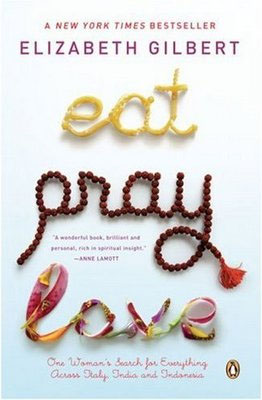
August 21st, 2010 by Peggy Polaneczky, M.D. in Better Health Network, Book Reviews, Health Tips, Humor, Opinion, True Stories
Tags: Antibiotics, Bladder Infection, Eat Pray Love, Elizabeth Gilbert, General Medicine, Gynecology, Health Tips for Travelers, Honeymoon Cystitis, International Travel, Macrodantin, Post-Coital Cystitis, Primary Care, Reproductive Health, Safe Sex, Sexual Activity, Sexual Health, SMTP, Sulfamethoxazole with Trimethoprim, Travel Habits, Urinary Tract Infection, Urology, UTI, Women's Health
No Comments »

 I really didn’t expect to like Eat, Pray, Love. In fact, since its publication in 2006, I’d been avoiding it like the plague. “Typical new-agey, Oprah-y, girly-book,” I thought. Nothing in it to speak to me.
I really didn’t expect to like Eat, Pray, Love. In fact, since its publication in 2006, I’d been avoiding it like the plague. “Typical new-agey, Oprah-y, girly-book,” I thought. Nothing in it to speak to me.
Then I saw the trailer for the movie, and I was hooked –- probably because I, like mostly everyone, love Julia Roberts. I immediately downloaded the book on my iPhone using the Kindle App and began to read.
First, let me say that Elizabeth Gilbert writes exceptionally well, and the book is actually a joy to read. I, of course, loved the Italy eating part. But more surprising to me, I wasn’t turned off by the whole yoga, Guru, find-yourself stuff. This is because Gilbert writes it all with a reporter’s curiosity and a skeptic’s eye, and frames it not as a belief system, but as a tool for self-discovery and peace. (Plus, I’m really good at skimming if I get bored.)
Too bad Gilbert’s curiosity and skepticism does not extend to the healthcare she receives while in Bali. She accepts the curative powers of a warm leaf placed on an oozing, infected cut without even wondering what leaf it might be or how it might have worked. Was it the heat (most likely) or something else (possibly)? I was dying to know.
She Xeroxes pages and pages of traditional medical treatments without sharing a single one with us in any meaningful way. While I’m pretty sure 99 percent of what was in there was bunk, there might be a few gems that would serve medical science. Unless Lizzie made a second copy, we’ll never know, will we?
But it was the UTI that really got to me. Read more »
*This blog post was originally published at tbtam*
August 20th, 2010 by Steven Roy Daviss, M.D. in Better Health Network, Health Policy, Humor, News, Opinion, Research, True Stories
Tags: Addiction Medicine, Controlled Substances, Drug Abuse, Drug Control, Herbal Incense, Home Chemists, Homemade Soap, JWH-018, K2, Medical Humor, Methamphetamine, Pharmaceuticals, Poison Control, Pseudoephedrine, Red Devil Lye, Research Labs, Spice, Substance Abuse, Substance Manufacturing, Synthetic Cannabinoid
No Comments »



By ClinkShrink
There’s always something new, even in the world of substance abuse. Lately I’ve been reading a lot in the media about K2, a synthetic cannabinoid that’s being sold (and outlawed) in many states. It’s commonly mixed with herbal incense and smoked. Nicknamed “spice,” it was originally created by scientists and called JWH-018.
Apparently some states’ poison control centers have been getting calls about it due to the physical symptoms it can cause, specifically palpitations and GI problems. The part of the story that I thought was interesting was the fact that originally only 250 milligrams of the stuff was created, in an “official” research lab, but that home chemists quickly took up the experiment and it’s now a part of our national drug culture. Read more »
*This blog post was originally published at Shrink Rap*
August 20th, 2010 by Happy Hospitalist in Better Health Network, Humor, Opinion, True Stories
Tags: Biology, Bodily Organs, General Medicine, Healthcare Economics, Heart, How Organs Work, Kidney, Lungs, Medical Humor, Most Important Organ, Organs in the Body, Skin
No Comments »

My medical student has apparently had a discussion with his classmates regarding which is the most important organ in the body. Is it the heart? The lungs? The kidneys? What do you think?
My medical student thinks it’s the kidney because of the complicated functions it must perform. I think it’s the skin because it holds everything together and keeps our economy going. What do you think? What is the most important organ in the body and why?
*This blog post was originally published at The Happy Hospitalist*
August 19th, 2010 by DavedeBronkart in Better Health Network, Expert Interviews, Health Policy, Opinion
Tags: Doc Tom, e-Patients.net, Healing Healthcare, Illness Care, Level Of Wellness, Medical Self-Care, Mother Earth News, Paticipatory Medicine, Tom Ferguson
No Comments »

 Next in our series of posts about our founder Doc Tom. Previous time capsules: 1980 and 1985.
Next in our series of posts about our founder Doc Tom. Previous time capsules: 1980 and 1985.
Come, ye economics buffs and algebra fans: Get out your pencils and solve for x, n, and XX:
Whatever else the year 19XX is remembered for, it will — without a doubt — go down in history as a record year for medical expenses here in the United States. All indications are that before the calendar year is out, Americans will have spent $x (n% of the Gross National Product) on drugs, X-rays, surgery, physicians’ fees, laboratory tests, hospital overhead, health insurance, etc. That’s up from the [$0.3x] ([.7n%] of GNP) just 13 years ago.
Clearly, the medical establishment has become a threat to the average American’s budget (if not his health).
Ready? That was…1978. Check the tiny numbers:
Whatever else 1978 is remembered for, it will—without a doubt—go down in history as a record year for medical expenses here in the United States. All indications are that before the calendar year is out, 216 million Americans will have spent $139 billion (8.6% of the Gross National Product) on drugs, X-rays, surgery, physicians’ fees, laboratory tests, hospital overhead, health insurance, etc. That’s up from the $39 billion (5.9% of GNP) medical care cost in 1965 . . . just 13 years ago.
Tom Ferguson was a medical student, and in the self-reliant era of the Whole Earth Catalog, he saw that patients could help heal healthcare by taking better care of themselves. In 1976 he’d started a magazine called Medical Self-Care. The text above appeared in Mother Earth News in May 1978, as the introduction to an 8,000-word interview with Tom. Read more »
*This blog post was originally published at e-Patients.net*
August 19th, 2010 by Debra Gordon in Better Health Network, Health Policy, News, Opinion, Research
Tags: Accelerated Approval, Avastin, Bevacizumab, Breast Cancer, Cancer Drug, Cancer Research, Cancer Survival Rates, Cancer Trials, Clinical Trials, Conditional Drug Approval, Drug Approval Revoked, Drug Risk Factors, FDA, Food and Drug Administration, Healthcare reform, Metastatic Cancer, Oncology, Progressive-Free Survival, Revoking A Drug, Targeted Monoclonal Antibody, Tumor Angiogenesis, Tumor Drug
No Comments »

Time to get back up on my soap box.
Next month the FDA is supposed to consider taking the unique, first-time-ever step of revoking a drug’s indication not because it’s dangerous, but because it doesn’t work well enough to offset its risks. Never mind that it costs about $8,000 a month.
The drug is Avastin (bevacizumab), a targeted monoclonal antibody that prevents tumors from creating and maintaining their own blood supply, a process called angiogenesis. Without oxygen and nutrients from blood, tumors can’t keep growing.
Avastin is the world’s best-selling cancer drug, approved for use with chemotherapy to treat lung cancer and metastatic colorectal and breast cancer. It is also being investigated (and, likely, being prescribed off label) for numerous other cancers. The problem comes with breast cancer. Read more »
*This blog post was originally published at A Medical Writer's Musings on Medicine, Health Care, and the Writing Life*
 I really didn’t expect to like Eat, Pray, Love. In fact, since its publication in 2006, I’d been avoiding it like the plague. “Typical new-agey, Oprah-y, girly-book,” I thought. Nothing in it to speak to me.
I really didn’t expect to like Eat, Pray, Love. In fact, since its publication in 2006, I’d been avoiding it like the plague. “Typical new-agey, Oprah-y, girly-book,” I thought. Nothing in it to speak to me.

















